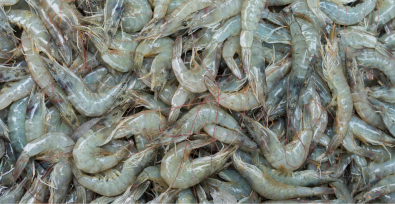The insatiable demand for shrimp in Western countries has led to the rapid expansion of hatcheries and processing plants across traditional farming communities in India. However, according to recent investigations by Corporate Accountability Lab (CAL), the Associated Press and Outlaw Ocean, not only are the new hatcheries and processing plants contaminating the water and soil making it almost impossible to staple grow crops like rice, they also hide exploitative working conditions bordering on modern slavery.
Forced to stay and work
CAL’s report “Hidden Harvest: Human Rights and Environmental Abuses in India’s Shrimp Industry” documents several forced labor indicators found at shrimp peeling sheds and farms.
Hatchery workers, often from lower castes or migrating from impoverished regions and neighboring states in India, are subject to various forms of exploitation including abuse of vulnerability, abusive working and living conditions, excessive overtime, and debt bondage.
The Outlaw Ocean Project shares the story of Joshua Farinella, an American former general manager of an Indian shrimp processing facility who left after witnessing the abuses firsthand.
At 3 a.m. on November 11, 2023, Farinella was woken up at his apartment, which was a short drive from the plant. A manager had sent a WhatsApp message informing him that a woman had been found running through the plant’s water treatment facility at 2:30 a.m. “She was searching for a way out of here,” the manager wrote matter-of-factly. “Her contractor is not allowing her to go home.” (Later, another manager would explain in a recorded conversation that workers used to escape over the concrete wall, but this had now been fixed “so no one can go out.”). The woman made it as far as the main gate, but was turned back by guards.
Modern slavery hiding behind cheap price tag
The women interviewed said despite illegally not being paid overtime or the federally mandated minimum wage, a job at the shrimp processing plant was their only chance to avoid starvation. Shrimp peeler, Penupothula Ratnam, is paid about $3 a day, below the legislated minimum wage, and shared through her tears that she suffers back pain all the time from the arduous work of her 10-hour shifts.
Speaking about her wages, Ratnam said:
“It’s not enough for our living and I rarely get a day off.”
The working conditions are so unsanitary that workers’ hands frequently get infected as they lack the basic safety and hygiene protections required under Indian law. Some even suffer frostbite or amputation, and pregnant women sometimes miscarry due to the backbreaking work.
When they aren’t peeling shrimp, they are locked inside guarded hostels. On top of all that, many workers say they are charged .25 cents a day just to be allowed to have the job and many workers have no actual contracts which means no recourse when they get hurt on the job. Despite these challenges, faced with a choice between exploitative work or starvation, the only option is to stay silent and accept the abusive conditions.
Ending the stench of labor exploitation in India
The drive to cut costs by U.S. supermarkets, restaurants, and wholesalers is what puts pressure on producers to provide cheaper shrimp and to ignore the appalling labor conditions and environmental damage currently going on. Indian companies need to be held accountable and pay a living wage as well as abide by existing labor, health, safety, and environmental laws. But more importantly, U.S. companies need to ensure that the price they pay for shrimp is enough for Indian exporters to treat workers equitably, and consumers need to be willing to pay more to keep modern slavery from tainting their shrimp.
The head of the Oceana illegal fishing and transparency campaign, Marla Valentine said consumers can help.
Valentine stated:
“You can use your dollar to make a difference, when this isn’t a lucrative business anymore, it will stop.”
Today, India is the leading supplier of shrimp to the U.S., accounting for 40% of the market. That title belonged to Thailand but thanks to the media and reports that exposed the modern slavery in the Thai seafood industry, India now dominates the U.S. shrimp market. Pointing to Thailand, Valentine says consumers using their purchasing power to leverage change has worked in the past. Thanks to the media and consumer spotlight shone on Thailand’s shrimp and seafood industry, the Thai government has been trying to adopt better practices and make reforms. Proof that by using our market power, change can happen.
You can use your power you and sign our petition calling on world leaders to put people and planet over profits, because working together we DO have the power to bring positive change!







Freedom United is interested in hearing from our community and welcomes relevant, informed comments, advice, and insights that advance the conversation around our campaigns and advocacy. We value inclusivity and respect within our community. To be approved, your comments should be civil.
Hi David that’s a really great idea – thanks for this! I invite you to create your own petition on this here: https://www.freedomunited.org/create-petition/
This is a great tool to make our work more community-centered.
Thanks so much! In solidarity, Kiki
Can Freedom United please start petitions that will put pressure on US. commercial users of shrimp produced through such slavery and exploitation conditions in India?
it is SHAMEFUL conduct by the indian slave drivers. the indian govt shamefully DOES NOTHING TO PROTECT THE POOR BUT ONLY SUPPORT RICH BUSINESS. people and govts all over the world MUST BE CAREFUL ABOUT CONSUMING PRODUCTS FROM THE INDIAN SEAFOOD INDUSTRIES WHICH ARE LACED WITH…..FORMALIN!